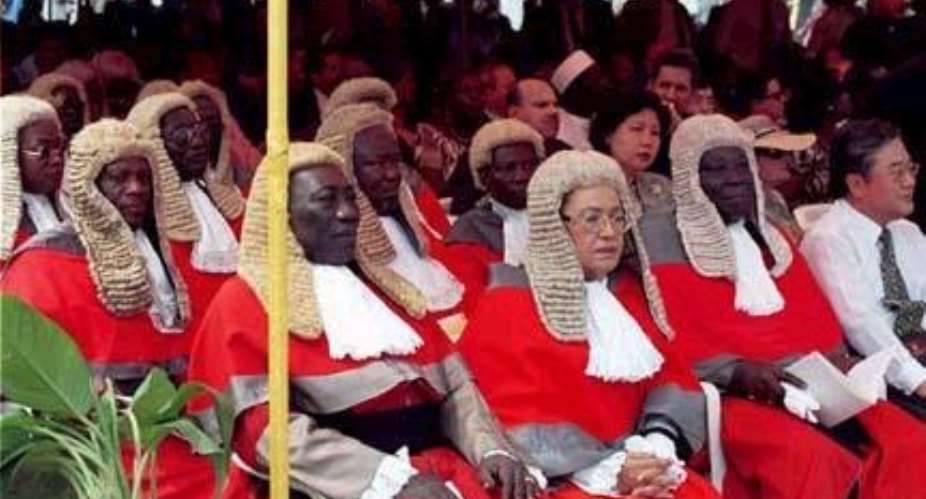The Supreme Court (SC) by a six-five-majority verdict on Wednesday reversed its earlier decision on the constitutionality of the Fast Track Court (FTC).
The six judges made up of the Chief Justice, Mr Justice Edward Kwame Wiredu, Mr Justice George Acquah, Mr Justice Williams Atugubah, Mrs Justice Sophia Akuffo, Mr Justice George Lamptey and Mr justice Kwame Afreh held the view that the FTC was not alien to the Constitution.
The five dissenting Judges, who were hitherto in the majority and maintained their earlier decision that FTC was unconstitutional were: Mrs Justice Joyce Bamford Addo, Mr Justice A. K. B. Ampiah, Mr Justice F. Y. Kpegah, Mr Justice E. D. K. Adjabeng and Mr Justice Thoedore Kwame Adzoe.
The court awarded a cost of 10 million cedis against Tsatsu Tsikata, former Chief Executive of the Ghana National Petroleum Corporation (GNPC), who brought the application, challenging the constitutionality of the FTC.
Tsikata was arraigned at the FTC for wilfully causing financial loss of 2.15 billion cedis to the State. He allegedly circumvented laid-down corporate objectives of GNPC, when he by-passed the Board and on his own, committed the GNPC to guarantee a loan.
The amount, 5.5 million French Francs was granted by Caise Francaise de Development, a French Aid Agency to Valley Farm, private cocoa-growing company, in which GNPC held initial equity shares of 17.39 per cent.
Distressed, Valley Farm defaulted in the repayment of the loan and without prior approval of the GNPC Board, Tsikata allegedly paid out of its operational funds, the principal amount plus interest, all totalling 6,919,123. 23 French Francs.
This action of his, adversely affected the financial status of GNPC, hence a loss to the State. Tsikata did not plead to the charge and the trial judge. Mr. Justice Julius Ansah entered a plea of not guilty for him and admitted him to a 500 million-cedi self-recognisance bail. In his application before the Supreme Court Tsikata stated that the FTC had no jurisdiction to try him.
At Wednesday's sitting, while the majority contended that the Chief Justice (CJ) had discretionary powers under the constitution to create divisions of the High Court, which the FTC was one, their counterparts on the minority side, maintained that the FTC needed parliamentary approval to bring it into being.
The majority argued that since Article 136 (4) of the 1992 Constitution conferred on the CJ, the exclusive powers to set divisions of the High Court, the FTC which he helped to establish remained legal. To them, the FTC was an innovation of the High Court in that it used automated systems that helped to speed up proceedings to ensure the quick delivery of justice.
The majority argued further that Article 139 (2) did not spell out methods for the CJ to create new courts, clause (3) of that same article, however prescribed that the CJ established courts to try criminal, civil, investment and other related matters, hence the establishment of the FTC.
The judges with dissenting view, stated that the CJ had no discretionary powers to create divisions of the High Court and to do so, he needed the nod from Parliament.


Top Stories
Just in....



 There’s nothing you can do for us; just give us electricity to save our collapsi...
There’s nothing you can do for us; just give us electricity to save our collapsi...
 Ghanaian media failing in watchdog duties — Sulemana Braimah
Ghanaian media failing in watchdog duties — Sulemana Braimah
 On any scale, Mahama can't match Bawumia — NPP Youth Organiser
On any scale, Mahama can't match Bawumia — NPP Youth Organiser
 Never tag me as an NPP pastor; I'm 'pained' the 'Akyem Mafia' are still in charg...
Never tag me as an NPP pastor; I'm 'pained' the 'Akyem Mafia' are still in charg...
 Your refusal to dedicate a project to Atta Mills means you never loved him — Kok...
Your refusal to dedicate a project to Atta Mills means you never loved him — Kok...
 2024 elections: I'm competent, not just a dreamer; vote for me — Alan
2024 elections: I'm competent, not just a dreamer; vote for me — Alan
 2024 elections: Forget NPP, NDC; I've the Holy Spirit backing me and nothing wil...
2024 elections: Forget NPP, NDC; I've the Holy Spirit backing me and nothing wil...
 2024 elections: We've no trust in judiciary; we'll ensure ballots are well secur...
2024 elections: We've no trust in judiciary; we'll ensure ballots are well secur...
 Performance tracker: Fire MCEs, DCEs who document Mahama's projects; they're not...
Performance tracker: Fire MCEs, DCEs who document Mahama's projects; they're not...
 Train crash: Railway ministry shares footage of incident
Train crash: Railway ministry shares footage of incident
